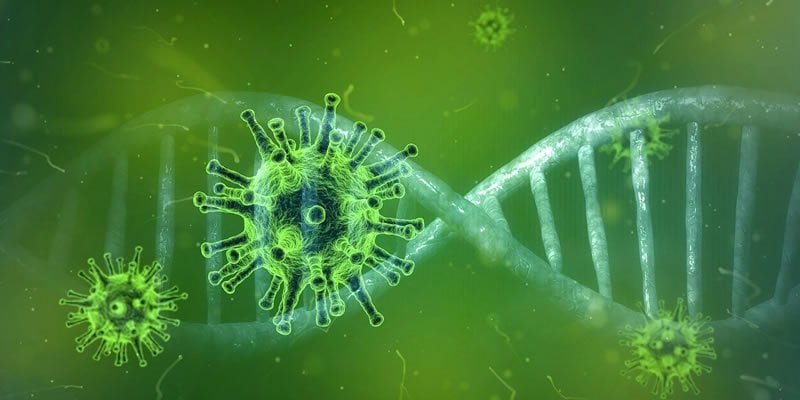Summary: Study reveals genetic variability in the immune system could affect susceptibility to coronavirus infection and govern the severity of the disease for those infected.
Source: American Society for Microbiology
Genetic variability in the human immune system may affect susceptibility to, and severity of infection by severe acute respiratory syndrome coronavirus 2 (SARS-CoV-2), the virus responsible for the coronavirus disease (COVID-19). The research is published today in the Journal of Virology, a publication of the American Society for Microbiology.
Individual genetic variation may explain differences in the strength of immune responses. Certain immune system genes, called human leukocyte antigen genes that are involved in recognizing pathogens, vary from person to person. Variations can influence how well the immune system recognizes a given pathogen. Poor recognition of SARS-CoV-2 could cause a person to be more vulnerable to the virus.
“In particular, understanding how variation in HLA [a component of the immune system containing multiple genes] may affect the course of COVID-19 could help identify individuals at higher risk from the disease,” according to the authors of the new study.
The authors show that individual HLA, haplotype, and full genotype variability likely influence the capacity to respond to SARS-CoV-2 infection, and note that certain alleles in particular could be associated with more severe infection, as has previously been shown with SARS-CoV.
“This is the first study to report global distributions of HLA types and haplotypes with potential epidemiological ramifications in the setting of the current pandemic,” write the authors, from Oregon Health & Science University, Portland, and the Portland VA Research Foundation.

“HLA typing can be fast and inexpensive,” the authors write. “Pairing HLA typing with COVID-19 testing where feasible could improve assessment of viral severity in the population. Following the development of a vaccine against SARS-CoV-2, the virus that causes COVID-19, individuals with high-risk HLA types could be prioritized for vaccination.”
About this coronavirus research article
Source:
American Society for Microbiology
Media Contacts:
Joanna Urban – American Society for Microbiology
Image Source:
The image is in the public domain.
Original Research: Closed access
“Human leukocyte antigen susceptibility map for SARS-CoV-2”. by Austin Nguyen, Julianne K. David, Sean K. Maden, Mary A. Wood, Benjamin R. Weeder, Abhinav Nellore, Reid F. Thompson.
Journal of Virology doi:10.1128/JVI.00510-20.
Abstract
Human leukocyte antigen susceptibility map for SARS-CoV-2
Genetic variability across the three major histocompatibility complex (MHC) class I genes (human leukocyte antigen [lsqb]HLA[rsqb] A, B, and C) may affect susceptibility to and severity of severe acute respiratory syndrome 2 (SARS-CoV-2), the virus responsible for coronavirus disease 2019 (COVID-19). We execute a comprehensive in silico analysis of viral peptide-MHC class I binding affinity across 145 HLA -A, -B, and -C genotypes for all SARS-CoV-2 peptides. We further explore the potential for cross-protective immunity conferred by prior exposure to four common human coronaviruses. The SARS-CoV-2 proteome is successfully sampled and presented by a diversity of HLA alleles. However, we found that HLA-B*46:01 had the fewest predicted binding peptides for SARS-CoV-2, suggesting individuals with this allele may be particularly vulnerable to COVID-19, as they were previously shown to be for SARS (Lin M, Tseng H-K, Trejaut JA, Lee H-L, Loo J-H, Chu C-C, Chen P-J, Su Y-W, Lim KH, Tsai Z-U, Lin R-Y, Lin R-S, Huang C-H. BMC Med Genet 4:9. 2003.). Conversely, we found that HLA-B*15:03 showed the greatest capacity to present highly conserved SARS-CoV-2 peptides that are shared among common human coronaviruses, suggesting it could enable cross-protective T-cell based immunity. Finally, we report global distributions of HLA types with potential epidemiological ramifications in the setting of the current pandemic.
IMPORTANCE
Individual genetic variation may help to explain different immune responses to a virus across a population. In particular, understanding how variation in HLA may affect the course of COVID-19 could help identify individuals at higher risk from the disease. HLA typing can be fast and inexpensive. Pairing HLA typing with COVID-19 testing where feasible could improve assessment of viral severity in the population. Following the development of a vaccine against SARS-CoV-2, the virus that causes COVID-19, individuals with high-risk HLA types could be prioritized for vaccination.
Feel Free To Share This COVID-19 and Genetics News.






